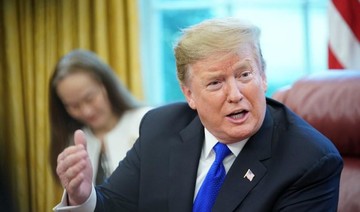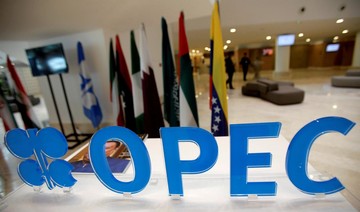BENGALURU: Oil analysts have grown more pessimistic over prospects of a significant price rally this year, as booming US shale output and a deteriorating global economic backdrop threaten to offset the boost from OPEC’s crude supply cuts.
A Reuters survey of 36 economists and analysts on Thursday forecast Brent crude oil futures to average $66.44 a barrel in 2019, slightly below the $67.32 projected in January’s poll. That also compares with the $62 average for the global benchmark this year.
This is the fourth straight month in which analysts have cut their oil price forecasts. Prices could rally gradually over the course of the year, if OPEC and their partners such as Russia agree to more production cuts in April, and if US sanctions on Iran and Venezuela lead to tightening global crude supply.
But the chances of a bigger price increase seemed remote, analysts said. “In the short-term, oil markets are going to be characterized by supply tightness on international markets thanks to the OPEC cuts and US sanctions on PDVSA,” Edward Bell of Emirates NBD bank said.
“Over the rest of 2019, though, the rising oil price sits incongruously with slowing economic growth in major markets.”
Major producers, led by OPEC, will meet on April 17-18 in Vienna to review their supply cuts, which were agreed in December to help avoid a build-up in global inventory that threatened to undermine the oil price. “There is no other choice than strict compliance, otherwise the oil market will remain oversupplied. Saudi Arabia is committed to achieve market rebalancing via steeper production cuts,” said Carsten Fritsch, senior commodity analyst at Commerzbank.
A monitoring committee for the OPEC and non-OPEC oil supply reduction deal found compliance with the cuts at 83 percent in January, delegates from the group told Reuters on Feb. 20.
While sanctions on Iran and Venezuela will tighten overall supply, “both countries have reduced their production and export levels sharply during 2018, which makes us think that potential further declines will not be as sharp and the impact on oil markets will not be as important as it was last year,” said Adrià Morron Salmeron, economist at CaixaBank Research.
Meanwhile, analysts estimated the outlook for global oil demand was mixed, growing by anywhere from 1.1 to 1.5 million barrels per day (mbpd) in 2019. This was broadly in line with the 1.1-1.7 mbpd range in last month’s survey and compares with the International Energy Agency’s forecast of 1.4 mbpd in demand growth this year.
Darkening economic outlook threatens to cap oil price in 2019
Darkening economic outlook threatens to cap oil price in 2019

- A survey of 36 economists and analysts forecast Brent crude oil futures to average $66.44 a barrel in 2019
- Prices could rally gradually over the course of the year, if OPEC and their partners such as Russia agree to more production cuts in April
Speed of Saudi innovation ‘wowing’ UK, says British trade campaign executive

RIYADH: UK delegates at the GREAT Futures Initiative Conference have been “wowed” by Saudi Arabia's business landscape, according to a senior British trade executive.
Speaking during an interview with Arab News, Kate Taylor Tett, director of the GREAT Britain and Northern Ireland Campaign, noted that the event served as a catalyst for change and progress by facilitating cross-sectoral collaboration and dialogue between counterparts from both nations.
She also stressed the fast pace of innovation observed in Saudi Arabia, which has left a strong impression.
“I think what this event has done is put Saudi right at the top of that list. So at the moment, you know, Saudi is the 24th biggest trading partner for the UK,” Tett said.
She added: “I think this top event will really accelerate that because people see it as an opportunity that they need to address right now, not at some point in the future, and hopefully that’s really exciting for businesses.”
Tett also stated that the event attendees were impressed by what they experienced in Saudi Arabia, which led to a shift in their opinions about the market.
“I haven’t spoken to a single person at this event who hasn’t been wowed by what they’ve seen when they’ve come here. I think their opinions have shifted, and that in itself is a huge opportunity,” she said.
Tett also explained that the event is not just a two-day gathering; it is a program that extends over a year and involves various collaborations between UK businesses and counterparts in Saudi Arabia.
“I know there’ll be lots of sort of cross-fertilization in that way, so this, these two days are very much a catalyst for initially a year-long program. But I think what you’ll see is that then that becomes a leap pad for things beyond that,” she said.
Commenting on the UK-Saudi partnerships, Tett emphasized the significance of innovation in collaboration between countries that are actively engaged in progressive undertakings.
She also stressed the fast pace of innovation observed in Saudi Arabia, which has left a strong impression.
“Everybody I’ve spoken to here has just been wowed by the pace of innovation in Saudi. And clearly bringing that innovation together and companies working together just creates these huge opportunities which have an economic benefit on both sides of the partnership,” Tett underscored.
She added: “I think what really hit me has been the energy and the positivity of everybody that I’ve met. I spent some time working in the world of startups, and I think Saudi feels like a huge startup. Everything feels possible.”
She concluded by expressing her enthusiasm among the participants and describing their collective drive to make progress as “really infectious.”
Saudi property forum to enhance local real estate supply chain access

RIYADH: Saudi real estate firms are poised to gain improved access to the supply chain with major industry players set to gather in Riyadh for an event designed to enhance cooperation and forge partnerships.
Under the patronage of the Minister of Municipal and Rural Affairs and Housing Majid bin Abdullah Al-Hogail, the National Housing Co. will host the Real Estate Supply Chain Forum from May 20 to 21 at the JW Marriot Hotel Riyadh, with the aim of fostering the growth of the property sector.
The event will gather a diverse array of local and international companies, consultants, contractors, and manufacturers to explore collaborative opportunities aimed at delivering integrated housing projects focused on quality and affordability, according to the Saudi Press Agency.
The forum will also provide promising investment opportunities, facilitate the signing of investment agreements and strategic partnerships, establish new standards, and find innovative solutions for real estate development.
Additionally, the gathering will unveil the latest agreements to secure supply chains between the NHC and a range of local and global partners.
Several scheduled dialogue sessions will showcase the latest technologies in the building materials industries. These talks will facilitate the exchange of expertise between local and international companies, aiming to enhance the supply chain network.
On May 5, the NHC signed a deal with China’s leading firm, CITIC Construction Group, to establish an industrial city and logistic zones for building materials, comprising 12 factories, with the objective of securing supply chains for the NHC’s housing projects.
NHC CEO Mohammad Al-Buty finalized the deal during Al-Hogail’s official visit to China.
The NHC said the agreement with the Chinese construction group is part of its efforts to secure supply chains for its housing projects and ensure their timely completion and high quality.
The Saudi company highlighted that the deal includes the construction of 12 factories specializing in building materials, harnessing Chinese expertise, and involving local factories to uplift business standards.
It added that the agreement also aims to draw top-tier service providers across various company sectors, its subsidiaries, and other projects.
The firm pointed out that the pact is expected to maximize the economic and developmental impact of the real estate sector in the Kingdom, develop housing projects, enhance their quality, and promote national transformation in the construction sector through these industrial cities and logistic zones.
British Airways to resume Jeddah operations, enhancing UK-Saudi connectivity

RIYADH: British Airways is set to resume operations in Jeddah after a five-year hiatus, aiming to enhance connectivity to the Kingdom, the airline said.
Announced at the GREAT Futures Initiative Conference held in Riyadh, the route is scheduled to commence on Nov. 4, offering year-round service to the Saudi city from London Heathrow, according to a press release.
The new service, operated by the Boeing 787 fleet, will total four flights per week, and sit alongside the daily operations between Riyadh and Heathrow.
Speaking at the event, Colm Lacy, British Airways’ chief commercial officer, said: “We have a long history of connecting families, friends and businesses in the Kingdom of Saudi Arabia with our home in London.”
He added: “There are significant opportunities for businesses in both countries, so we’re pleased we can re-build our connectivity and strengthen links between the two kingdoms.”
In a joint statement, Mazen Johar, CEO of Jeddah Airports, and Majid Khan, CEO of Saudi Air Connectivity Program, said: “The return of the UK’s flag carrier to Jeddah, with new flights from London Heathrow, will further strengthen our air connectivity from the capital.”
They added: "With British Airways’ leading network in the UK, Europe, and onwards to North America, travelers can experience an untouched wonder, Saudi Arabia, through one of the leading global carriers, further supporting our growing inbound tourism and aviation market.”
Earlier this week, the Kingdom’s General Authority of Civil Aviation released a statement revealing that an ambitious roadmap outlining Saudi Arabia’s tenfold growth in the aviation sector into a $2 billion industry is on track to be unveiled at the Future Aviation Forum in May.
The plans encompass the business jet segment, including charter, private, and corporate aircraft, and aim to bolster Saudi Arabia’s development as a global high-value enterprise and tourist destination, the statement noted at the time.
It also highlighted that the plan comes after Saudi Arabia revised its 2030 tourism target upward from 100 million to 150 million visitors in October 2023.
Also earlier this week, the Kingdom’s Minister of Commerce announced that partnerships between Saudi Arabia and the UK encompass over 60 initiatives across 13 sectors, with trade between the countries up by a third since 2018.
During the opening remarks of the GREAT Futures Initiative Conference, Majid Al-Qasabi noted that bilateral trade surged between 2018 and 2023, exceeding £79 billion ($99.12 billion).
With over 1,100 active licenses for UK investors, developments such as the giga-projects in the Kingdom and policy reforms are enhancing business opportunities, the minister emphasized.
Closing Bell: Saudi main index dips for the second consecutive day

RIYADH: Saudi Arabia’s Tadawul All Share Index continued its downward movement for the second consecutive day, as it shed 17.71 points to close at 12,103.20.
The total trading turnover of the benchmark index on Wednesday was SR6.30 billion ($1.68 billion), with 128 stocks advancing and 96 declining.
On the other hand, Nomu, the parallel market, marginally went up by 0.03 percent to 26,666.16.
However, the MSCI Tadawul Index edged down by 0.47 percent to close at 1,512.30.
Saudi Industrial Development Co. was the best-performing stock on the main index. The company’s share price surged by 9.95 percent to SR9.61.
Other top performers were Wafrah for Industry and Development Co. and Al-Baha Investment and Development Co., whose share prices soared by 9.9 percent and 7.69 percent respectively.
The worst-performing stock was Basic Chemical Industries Co., as its share price slipped by 7.57 percent to SR33.60.
On the announcements front, Seera Group Holding revealed that its net profit rose to SR61 million in the first quarter of this year, representing a rise of 7.01 percent compared to the same period of the previous year.
In a Tadawul statement, the travel firm noted its total revenue for the first quarter stood at SR1.07 billion year on year driven by continued growth in the car rental and travel platform segments and the new acquisitions within Portman Travel Group.
Lumi Rental Co. also announced its financial results. The company said that its net profit fell by 11.15 percent to SR44.71 million in the first quarter of this year compared to the same period in 2023.
Zamil Industrial Investment Co., which reported its earnings, revealed that it swung to a net profit of SR5.42 million in the first three months of this year, compared to a net loss of 13.81 million in the same period of the preceding year.
Zamil attributed the rise in profits to its sales growth, which went up by 25.5 percent, along with higher operating income in the steel and insulation sectors.
Meanwhile, Shatirah House Restaurant Co., also known as Burgerizzr, reported a net profit of SR5.3 million in the first quarter of this year, compared to the SR1.4 million net loss it incurred in the same quarter of 2023.
In a Tadawul statement, Burgerizzr said that the rise in net profit was driven by higher same-store sales and an increased number of guests.
AI, tech to reshape healthcare in Saudi Arabia, UK: experts

RIYADH: Saudi and British experts on Wednesday highlighted the importance of artificial intelligence and technology to enhance healthcare.
Taking to the main stage on the second day of the GREAT Futures Conference in Riyadh, experts from both nations shed light on the fast-evolving landscape of the health sector and the increasing role of the latest technology in that evolution.
A series of panel discussions revealed that the Kingdom aims to reduce waiting time and costs and improve the quality of life for its citizens through a strong focus on a more preventive, patient-centric system that brings quality care beyond the walls of the hospital and into an individual’s own home.
Inaugurating the event, the CEO of the Health Sector Transformation Program, which is part of the nation’s Vision 2030 directives, Dr. Khalid Al-Shaibani, said: “In Saudi Arabia, we have embraced digital health as a priority because of its potential to enhance healthcare delivery, improve patient outcomes, and drive economic growth.”
The CEO further posited that through a clear and unified vision, all sectors of the Saudi government are working together to make this future a reality, saying: “This initiative represents a bold and innovative approach where various sectors collectively work to enhance the health of our nation. By integrating health, equity, and sustainability into all decision-making processes, we foster an environment that promotes the well-being of our citizens.”
A future that, according to Al-Shaibani and his fellow speakers, including the UK’s Undersecretary of State in the Department of Health and Social Care, Nick Markham, and Dr. Abdulaziz Al-Homod, chief medical officer of Seha Virtual Hospital, could allow medical professionals to bridge the gap between primary and secondary care.
This period, which is often characterized by an utter lack of awareness of the patient’s condition, could be supplemented by wearable technology, which could then track the patient’s vitals while simultaneously uploading them to a unified database, allowing for a clearer understanding of the patient’s progress before secondary care.
Al-Homod noted that in secondary care, which could also become costly, innovation could further become an asset by allowing visits to be virtual, cutting costs and improving efficiency.
Highlighting the overall enthusiasm of the nation, he said: “It’s good to be here during this time and era if you are a company or a startup that wants to work in healthcare, there is a clear will and a clear strategy and we are focused on people. The healthcare ecosystem is hungry for innovation, and we think NEOM is gonna be unique and that Saudi Arabia is going to continue to lead (in healthcare innovation).”
Discussing areas of collaboration between the two kingdoms and the ever-present question of the use of AI, the undersecretary of state noted that the UK’s national health system, known as the NHS, has an extensive database, perhaps the largest in the world, due to its unified presence since 1948.
This data could be “fed” to AI to allow for the detection of patterns that were perhaps previously not possible through merely the human eye.
Markham said: “Actually, we can pull this all together into a fantastic set of data which can be used on parallel anywhere else, and we’ve got the diversity of the population as well because we know a lot of countries have homogeneous populations. You throw that all at AI and start to see patterns that we can’t see.”
According to the British official, this could serve to address long-standing medical questions, such as early detection of dementia and its treatment.
Further affirming the collaborative relationship between the two nations in the field of emerging technologies, the head of the Research Development and Innovation Authority, Mohammed Al-Otaibi, noted that Saudi Arabia, represented by his body, signed a memorandum of understanding with the UK’s Department for Science, Innovation and Technology to work on research and development in deep-tech and science fields.
Looking to the future, Al-Otaibi pointed to the recently launched Research Lab Support Program, which aims to disperse SR312 million ($83 million) to 30 entities overseeing 86 research labs across the Kingdom to accelerate R&D in medicine and beyond.














